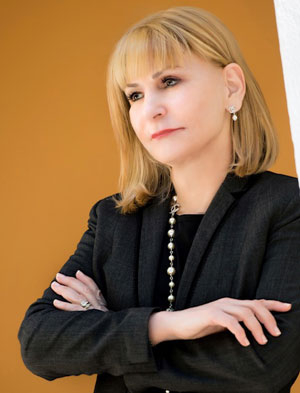Elizabeth Holmes, once the poster child for Silicon Valley entrepreneurship, was found guilty in early January on four counts of investor fraud and faces up to 20 years in prison and a $250,000 fine on each count. The Stanford dropout’s uber confidence and bravado over a span of years influenced a bevy of investors—mostly powerful white men—to contribute some $945 million to her startup and catapulted Holmes to billionaire status, at least on paper.

Linda Neider, a professor in the Miami Herbert Business School and chair of the Department of Management, and Louise Davidson-Schmich, a political science professor who studies the interface of gender and leadership power, dismissed the idea that the verdict signifies a rebuke of Silicon Valley’s “fake-it-till-you-make-it culture.” Instead, they point to Holmes as an exaggerated case of startup chicanery and of an individual whose manipulative behaviors were celebrated instead of restrained.
“One of the most important lessons from cases such as this one is that integrity matters—period,” said Neider, former director of the Master of Science in Leadership Program and co-founder of the Master of Science in Technology Management Program.
“As employees we need to observe what leaders do in addition to what they say,” Neider emphasized. “Elizabeth Holmes ‘talked' about her compassion for patients yet did not treat those around her with respect or compassion. Anyone who dared to disagree with or question her, was terminated—transparency was squelched.”

Neider noted the incongruency of the Theranos’ workplace with the firm’s stated mission “to facilitate the early detection and prevention of disease and empower people everywhere to live their best possible lives.”
A 2021 Harvard Law School study on Silicon Valley diversity found that only 4.7 percent of executives are women. Both Davidson-Schmich and Neider pointed to the unique pressures that women leaders face in the industry but noted that Holmes’ beguiling behavior stood out as anomalous and self-serving.
“Generally, people from traditionally excluded groups seeking to rise in a prestigious field struggle with under confidence and imposter syndrome. They don’t go on self-promoting media jags and commit crimes,” Davidson-Schmich said. “Her behavior seems closer to that of Bernie Madoff and other white men involved in Ponzi schemes.”
“The fact that she was a conventionally attractive white woman who went to Stanford certainly opened a lot of doors for her and probably made it easier for potential investors to feel comfortable with her and be taken in by her fraudulent claims,” suggested Davidson-Schmich.
Neider indicated that Holmes modeled herself, in terms of attire and mannerisms, after a Silicon Valley icon: Steve Jobs.
“Given the dearth of female role models in Silicon Valley, of course, it is not surprising that Holmes chose a highly successful marketer who actually did deliver—and more—on his promises,” Neider explained. “She came across as highly confident, in control, and visionary—the clear face of a company worth $9 billion. And all based on charismatic promises of a diagnostic device that never materialized.”
Neider highlighted the contrast in the hard-charging mogul’s behavior during her rise to fame and fortune with that of the defendant who entered the courtroom each day clutching her mother’s hand or that of her current partner.
“The irony is that when her fraudulent claims were discovered, she portrayed herself as the 'victim,’” Neider declared. “Her role as a leader was buried, and she tried to garner sympathy by stating she was raped in college; abused over a 10-year period by her partner, [Ramesh “Sunny”] Balwani; and misled by those she depended on for technical knowledge within Theranos.
“These behaviors tell us less about gender issues than they do about Holmes' highly manipulative behavior patterns. Even when the house of cards came tumbling down, she still looked for ways to ‘market' or frame the situation to maximize her own personal benefits,” Neider pointed out.
During the 15 weeks of the trial, the prosecution called 28 witnesses, though only three testified to the charges of defrauding patients. The jury dismissed the four counts of defrauding patients. Three other fraud counts were unresolved, and indications are that the prosecution will not pursue.
Holmes took the stand for seven days and anchored her defense in large part on allegations that she was misled, bullied, and abused by her former chief operating officer Balwani, with whom she managed a secretive 10-year relationship.
“I was not at all surprised that the jury found her guilty on four charges related to defrauding investors but was surprised that they did not find she purposefully misled patients,” said Neider, adding that the latter was potentially even more harmful. “Although she was not convicted for jeopardizing the health of patients, what if some have died due to her fraudulent practices?”
Theranos was shut down in 2018 based on revelations of the inaccurate and unreliable testing practices. The startup then paid to settle cases of investor lawsuits/fraud charges with the Securities and Exchange Commission.
Holmes, 37, is currently free on $500,000 bond secured by property. In this landmark case of the first Silicon-Valley CEO found guilty of white-collar crime, her sentencing hearing is set for Sept. 26. The trial for co-conspirator Balwani begins that same month.
If not a rebuke of the Silicon Valley workplace “hustle” culture, what message if any does the trial send to future business leaders?
“I would hope that future business leaders always keep their moral compass close to them as they contemplate decision-making at every level,” said Neider.

